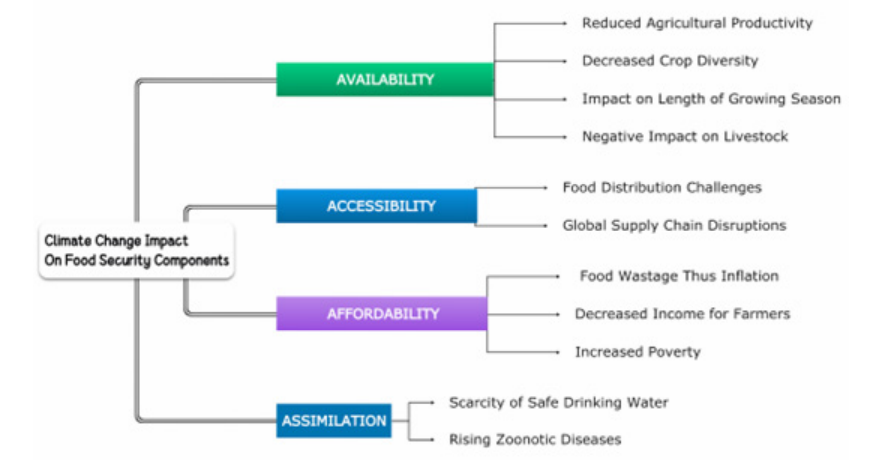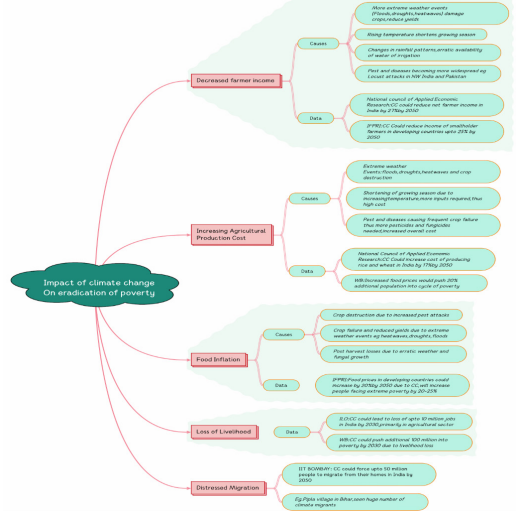
Climate change poses a formidable threat to global food security and poverty eradication, presenting a multifaceted challenge that demands urgent attention and comprehensive solutions. The intricate interplay between climate patterns and agricultural productivity has far-reaching consequences, affecting the livelihoods of millions and exacerbating existing vulnerabilities. As temperatures rise, extreme weather events become more frequent, disrupting traditional farming practices and diminishing crop yields. This not only jeopardizes the availability and affordability of food but also hampers efforts to lift communities out of poverty. In critically examining the nexus between climate change, food security, and poverty eradication, it becomes evident that concerted international efforts are imperative to mitigate the impact, adapt to the changing conditions, and create sustainable pathways for a resilient and equitable future.
Contents
- 1 Answer
- 1.1 Reduced Agricultural Productivity
- 1.2 Impacts on the Length of Growing Seasons
- 1.3 Decreased Crop Diversity
- 1.4 Negative Impact on Livestock
- 1.5 Global Supply Chain Disruptions
- 1.6 Case Study: Reduced Grain Production and Export Potential in Australia due to El-Nino
- 1.7 Climate Change Impact on Eradication of Poverty
- 1.8 The Road Ahead
- 2 In case you still have your doubts, contact us on 9811333901.
Answer
According to the World Bank, climate change(CC) will lead to compromised global food security and could push an additional 100 million people into poverty by 2030.

Reduced Agricultural Productivity
- CC leads to more frequent and severe weather events, such as droughts, floods, unusual high temperatures, hurricanes, and heatwaves, damage crops, reduce yields, and disrupt food production.


Impacts on the Length of Growing Seasons
- Changing temperature and precipitation patterns alter the timing of planting and harvesting,difficult for farmers to predict when to cultivate their crops,uncertainties lead to reduced agricultural productivity.
- For eg.In parts of India, shifting monsoon patterns have disrupted the traditional cropping calendar, affecting crop yields and food availability.
Decreased Crop Diversity
- Climate change can limit the types of crops that can be grown in certain regions.
- For eg.Due to irregular rainfall patterns and rising temperatures,highly water sensitive maize yields are getting affected,pests like fall armyworm are getting more active and spreading to newer areas as well.
Negative Impact on Livestock
- Heat stress and reduced water availability increase livestock’s disease susceptibility and can harm livestock health and reduce meat and dairy production.
- For eg.In some parts of Australia, prolonged heat waves have led to livestock deaths and a decline in meat production.
Global Supply Chain Disruptions
- CC exposes vulnerabilities in supply chains by affecting the availability of resources, such as water and energy, disrupting production processes, and leading to supply shortages.
Case Study: Reduced Grain Production and Export Potential in Australia due to El-Nino
- Food wastage thus inflation
- CC related events leads to crop failure and high temperatures cause increased pest attacks, supply of certain food items can decrease, With less supply and constant or growing demand, prices tend to rise, causing inflation in the food sector

Climate Change Impact on Eradication of Poverty
- Decreased farmer income and increased vulnerability to poverty
- Increasing agricultural production cost and vulnerability to poverty
- Food inflation and increased vulnerability to poverty
- Loss of livelihood and increased vulnerability to poverty
- Distressed migration and increased vulnerability to poverty

The Road Ahead
- Invest in climate-smart agriculture that helps farmers to produce food in a sustainable way while also adapting to the effects of climate change,eg.using drought-resistant crops, improving irrigation systems, and diversifying crops according to the agroecological scheme of different regions.
- Social safety nets can help to protect the poor from the economic shocks caused by climate change.eg.PMFBY
- Investing in rural development can help to make rural communities more resilient to the effects of climate change.
Climate change poses a severe threat to global food security and poverty eradication. Programs like National Mission for Sustainable Agriculture (NMSA),Pradhan Mantri Krishi Sinchayee Yojana,Paramparagat Krishi Vikas Yojana (PKVY) by Indian government are a step in right direction to achieve SDG1(No Poverty) and SDG2(Zero Hunger).
In case you still have your doubts, contact us on 9811333901.
For UPSC Prelims Resources, Click here
For Daily Updates and Study Material:
Join our Telegram Channel – Edukemy for IAS
- 1. Learn through Videos – here
- 2. Be Exam Ready by Practicing Daily MCQs – here
- 3. Daily Newsletter – Get all your Current Affairs Covered – here
- 4. Mains Answer Writing Practice – here

